Menstrual cramps are a common issue that many women experience during their cycle. However, certain lifestyle changes can help reduce the severity of cramps and provide relief. Here are some effective strategies:

- Exercise Regularly
Why it helps: Regular physical activity increases blood flow, reduces stress, and releases endorphins, which act as natural painkillers. Even moderate exercises, such as walking or yoga, can significantly reduce cramps.
What to do: Aim for 30 minutes of moderate exercise a few times a week, especially during your menstrual phase.
- Maintain a Healthy Diet
Why it helps: Eating anti-inflammatory foods can help reduce pain and inflammation. A balanced diet rich in fiber, fruits, vegetables, and healthy fats helps stabilize hormone levels and reduces cramping.
What to do: Focus on foods like leafy greens, fish rich in omega-3s (salmon, mackerel), nuts, seeds, and whole grains. Reduce your intake of processed foods, caffeine, and salty snacks.
- Stay Hydrated
Why it helps: Dehydration can worsen cramps. Drinking plenty of water helps reduce bloating and discomfort, which can alleviate some of the pain associated with menstrual cramps.
What to do: Aim to drink 6-8 glasses of water per day, and consider herbal teas such as ginger or chamomile, which may also have anti-inflammatory properties.
- Practice Stress Management
Why it helps: High-stress levels can worsen cramps and disrupt hormonal balance. Reducing stress can have a direct impact on alleviating menstrual pain.
What to do: Engage in relaxation techniques such as meditation, deep breathing exercises, or mindfulness. Regular practice of these techniques can help you manage stress more effectively.
- Use Heat Therapy
Why it helps: Applying heat to your lower abdomen or back can relax muscles and relieve tension, thus reducing cramps.
What to do: Use a heating pad, hot water bottle, or warm compress for 15-20 minutes at a time to relieve discomfort.
- Consider Supplements
Why it helps: Some vitamins and minerals can help reduce cramps and improve overall menstrual health.
What to do: Consider taking magnesium (which can help relax muscles), vitamin B1 (thiamine), and vitamin E, as they have been shown to help reduce menstrual pain.
- Limit Caffeine and Alcohol
Why it helps: Both caffeine and alcohol can increase muscle tension and dehydration, which can make cramps worse.
What to do: Try reducing your intake of coffee, tea, and alcohol, especially during the days leading up to and during your period.
- Get Enough Sleep
Why it helps: Lack of sleep can increase the body’s stress response, making menstrual cramps more painful.
What to do: Aim for 7-9 hours of quality sleep each night. Create a relaxing bedtime routine and try to maintain a consistent sleep schedule.
- Try Acupressure or Acupuncture
Why it helps: Acupressure and acupuncture can help balance the body’s energy flow and reduce pain associated with cramps.
What to do: Look for a licensed acupuncturist or try acupressure tools at home for menstrual discomfort.
- Consider Birth Control or Menstrual Medications
Why it helps: Birth control can regulate hormones and reduce the severity of menstrual cramps. Non-steroidal anti-inflammatory drugs (NSAIDs) such as ibuprofen can also alleviate pain.
What to do: If cramps are severe or persistent, consult with your healthcare provider to explore options like birth control or other medications.
Conclusion
By implementing these lifestyle changes, many women find that they can manage their menstrual cramps more effectively. However, if cramps are severe or interfere with daily activities, it is important to consult a healthcare professional to rule out other underlying conditions such as endometriosis or fibroids.